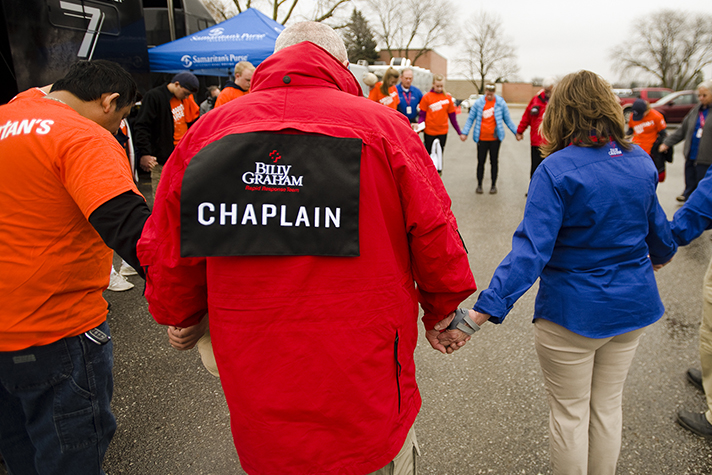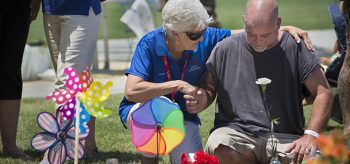
Have you ever wondered what it’s like to be a Billy Graham Rapid Response Team (BG-RRT) chaplain?
Since 2002, these men and women have responded to hundreds of crises worldwide—offering emotional and spiritual support to hurting people.
Chaplains meet the suffering during some of life’s darkest moments to listen, pray, and share the love of Jesus Christ—the only One who can provide peace that guards hearts and minds during tragedy (Philippians 4:7).
Josh Holland, international director of the BG-RRT, recently shared about what chaplains often experience during a deployment.
A Typical Day
After breakfast and devotions with other volunteers, chaplains go out into the community in pairs—a model Jesus created when He sent the disciples out in Mark 6:7.
“As one chaplain is primarily doing the talking, the other could be there just praying for the conversation,” Holland explained. “Everybody has a different perspective—one of the chaplains might be more equipped to speak into a certain situation.”
The team spends much of the day listening to—and praying with—shaken residents, and they offer resources to help hurting people draw closer to Jesus amid struggles.
Whether in a store parking lot or during a quick lunch, God often opens doors for “ministry on the way.”
The team also serves as spiritual support for Samaritan’s Purse volunteers before and after they work—often in the midst of destruction that can be difficult to process.
Attributes of a Chaplain
While they must complete some basic training requirements prior to serving, Holland described chaplains as “everyday believers that have empathy.”
“A lot of times, they’ve gone through crisis and seen how God has led them through a traumatic situation themselves.”
The vast majority do not come from a pastoral or counselling background, but simply “speak with the compassion of Christ in situations where people have experienced great loss.”

Lodging and Living Situations
Volunteers often sleep, shower, and eat at the deployment site, which is normally a local church. Chaplains bring their own toiletries, towels, and bedding to set up camp when they arrive.
“Think mission trip-type accommodations,” Holland explained.
Volunteers are usually responsible for covering the cost of their travel to the deployment site—including transportation, lodging, and meals on the way.
“Lots of people drive across the country—some even fly,” said Holland.
Other Difficulties
Chaplains often experience a common situation: people are going through hard times before the disaster strikes. Their current crisis is just another weight on top of pre-existing burdens.
Survivors are often emotionally frazzled and worn out, and conflicts frequently arise.
“Just come with realistic expectations,” Holland said. “Having a thick skin is important.”
At times, there is no electricity or water in the disaster zone for the first couple of days—resulting in the lack of showers.
“They are long days,” Holland said, adding that chaplains often experience spiritual warfare while deployed. “We encourage our chaplains to have a team of people back home praying for them on a deployment.”

Partnering With Samaritan’s Purse
Volunteers from sister ministry Samaritan’s Purse do manual jobs such as cleaning up yards, removing moldy drywall, and mudding out flooded homes.
As Samaritan’s Purse physically serves as the “hands and feet” of Jesus, chaplains have a platform to speak encouragement into homeowners’ lives—and provide the emotional and spiritual care they desperately need.
“We tell our chaplains 90% of their time is usually just listening,” Holland explained, sharing that people have a lot to unload.
‘Privileged to Be a Part’
Every day on the field, chaplains plant seeds of the Good News of Jesus Christ and let people know that God loves them—even during their darkest hour.
“There’s nothing like when you see someone on a deployment experience a new birth, understand the message of salvation, and pray to receive Christ,” said Holland.
“We all feel privileged to be a part of it.”


